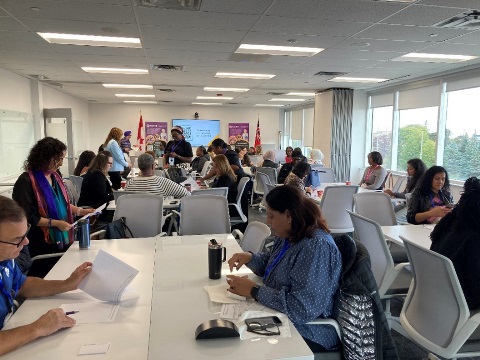
Facilitating Culturally Safe First Interactions
In October, CWICE team members facilitated a new training for professionals working with international students and newcomer young adults. The training aimed to foster culturally safe interactions with a focus on mental health. While CWICE was proud to host the events in our offices and facilitate sessions, we worked alongside many organizations to deliver the training.
The training program was designed as part of a larger project, funded by the Region of Peel’s Community Safety and Well Being Plan; Mental Health and Addictions Action Table. That project continues to be led by Peel Newcomer Strategy Group (PNSG) at United Way Greater Toronto, who strategize with a wide range of partner organizations. When the need for training emerged, PNSG engaged in discussions with the University of Toronto Faculty of Medicine and developed the training in collaboration with Catholic Family Services Peel-Dufferin, Punjabi Community Health Services, Roots Community Services, Trillium Health Partners; Sheridan College; COSTI; Algoma University; with support from Peel CAS’ Child Welfare and Immigration Centre of Excellence (CWICE).
The training involved a virtual session on October 3, facilitated by Suchira Banerjee of Catholic Family Services Peel-Dufferin and Shane Joseph of Roots Community Services. Suchira provided attendees an overview of the training, standardized patient program at U of T, and the in-person training later in October. Shane facilitated the remaining session to discuss, engage, and enhance participants’ understanding of culturally responsive and safe service delivery.
Of the 80 attendees for this program, they joined us from across the Greater Toronto Area, and represent many sectors and organizations. Participating sectors included professionals from settlement organizations, mental health healthcare service providers, children and family services, school boards and staff in post secondary institutions. The training was specifically designed to help participants who may be the first point of contact and/ conduct intakes with clients. The training objectives were:
1. Participants are able to initiate an interaction for intake that is culturally safe and responsive to support the initiation or referral for mental health supports and services for newcomer young adult or international student.
2. Participants demonstrate awareness of specific issues related to conducting an intake for mental health service such as building initial rapport to learn about their current situation, supports, strengths; and awareness and reduction of stigma.
Following the virtual session, the 80 attendees selected an in-person session to attend. As facilitators, we hosted two in-person sessions for 40 trainees. Participants attended the in-person session in our office and engaged in role play completing intakes with standardized patients (SPs). SPs are trained actors, working with U of T, who simulate real patients/clients, presenting specific characteristics, and experiences to help teach students and professionals how to interact with patients with a range of needs and from diverse cultural backgrounds. Eight CWICE team members facilitated groups of 5, working with SPs, using two thoroughly developed case scenarios.
Through role play, discussion, and feedback in a controlled setting, participants were able to further develop their awareness, knowledge, and the skills needed to work effectively and respectfully with people from diverse cultural backgrounds who may be experiencing emerging mental health needs.
As facilitators, our CWICE team members are social workers who have been taught in this modality of learning during undergraduate and graduate education. CWICE facilitators supported learners to explore two case scenarios, during workshops on October 9 and 11, 2024. We supported SPs to reproduce the scripted scenarios with a predefined set of historical, emotional and/or physical criteria, including portraying personality traits and behavioural characteristics.
Early feedback has been quite positive in nature. Along with the wider planning team, and their organizations, we are proud of the success of this cross-sector, community-based, innovative training. We’re happy to share some feedback that has been gathered so far:
Participants shared:
"I have unlearned so much”
“I hope we can keep this going”
“I thought this was going to be a training where I was going to be sitting and listening”
“I thought the training was ‘raw’”
“This was a great refresher as I am a supervisor and I’ve had training like this during my education, but it was my peers who were the SPs, so it didn’t have the same impact.”
Thanks to our CWICE facilitators - Claudia Obreque, Celistine Frampton, Mandisa Sifelani, Abimbola Fajobi, Rosario Elmy, Abimbola Oyeyinka, Liz Okai and Danielle Ungara.

Attendees at the October 9, 2024 in-person session.
